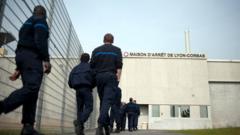A significant disruption to train services in Spain was reported after thieves stole copper cables, leaving thousands stranded. Authorities are investigating the incident, which is affecting travel to popular destinations just before the Feria festival.
Copper Cable Thefts Cause Major Disruption in Spanish Rail Services

Copper Cable Thefts Cause Major Disruption in Spanish Rail Services
Over 10,000 rail passengers affected by cable thefts, prompting an investigation into the sabotage.
The tranquillity of Spain's rail system was shattered this past weekend when the theft of copper cables caused major travel disruptions for thousands of passengers. The incident, which took place on Sunday, impacted high-speed train services connecting Madrid to several cities in the southern region of Andalusia, including Seville, Malaga, and Granada, leaving over 10,000 travelers stranded.
Transport Minister Óscar Puente condemned the theft as a “serious act of sabotage,” revealing that the cables were stolen from five locations situated close to each other along the high-speed rail line. The theft coincided with a long holiday weekend in Madrid, creating ripple effects through the rail network just ahead of Seville's anticipated Feria festival.
Frustrated passengers like Kevin from the US expressed their dismay as they waited at Madrid's Atocha station, highlighting the recent series of travel disruptions, including a nationwide blackout just a week prior, the cause of which remains unclear.
By Monday morning, train operations began returning to normal, with hopes of full restoration echoing from officials and Spain's national rail manager Adif. The transport minister acknowledged the hard work of staff who navigated the complications posed by the incident.
The interior ministry announced a collaboration with civil guards and police to investigate the theft and pursue those responsible. Rising copper prices have contributed to an increase in cable thefts from rail and telecommunications networks across Spain, prompting an urgent need for enhanced security measures.





















